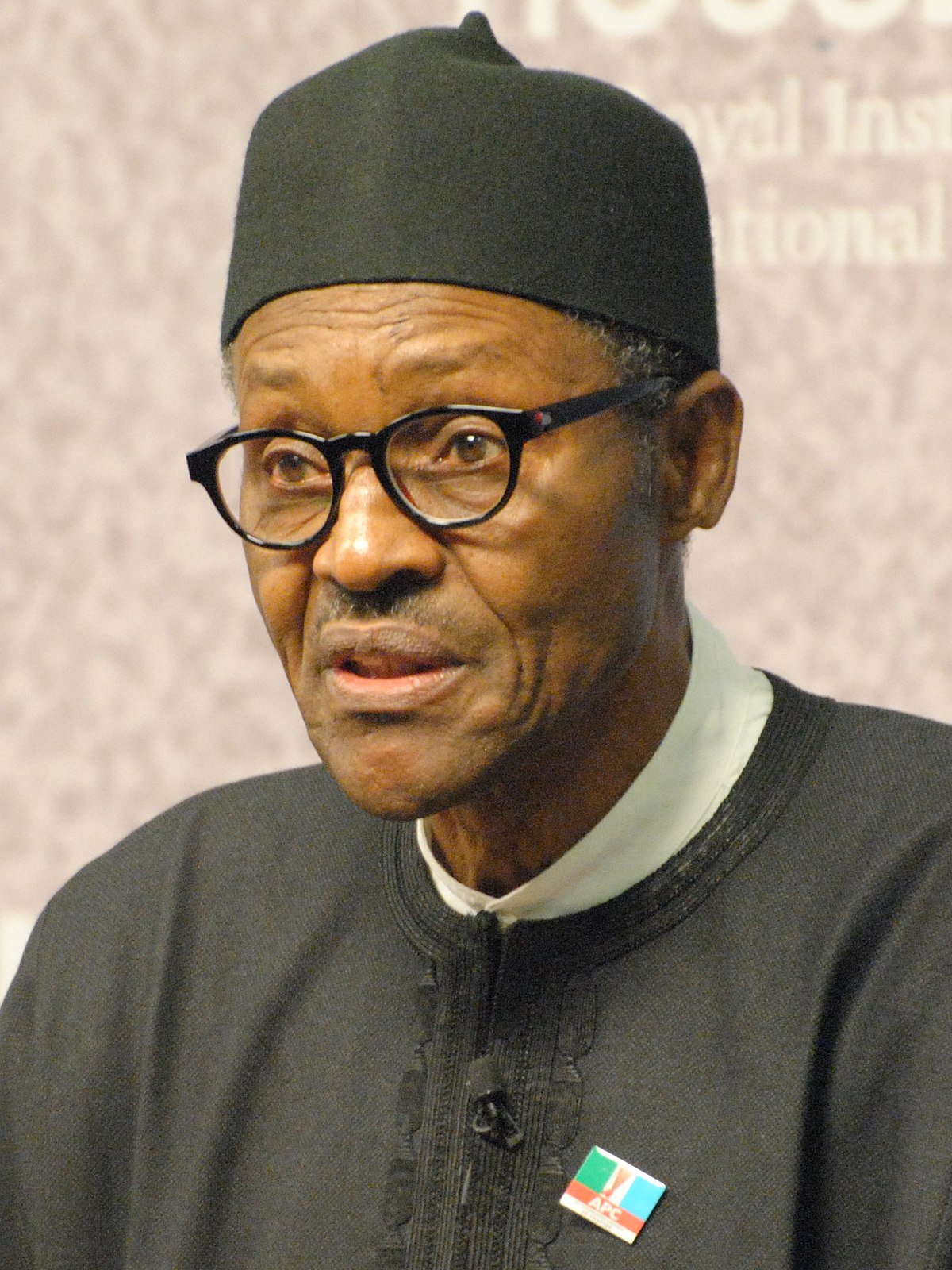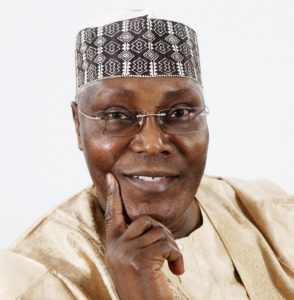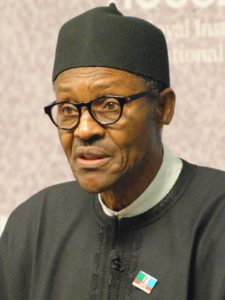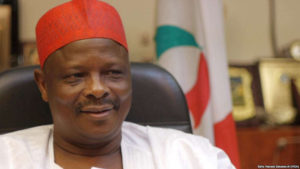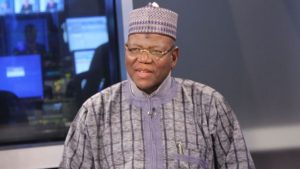The centre seems to no longer hold for top politicians within the ruling All Progressives Congress (APC) as the 2019 presidential election draws near. That all is not well within the party is evident in the uproar that was witnessed as a result of Women Affairs Minister, Aisha Alhassan’s open support for Alhaji Atiku Abubakar’s presidential bid in 2019.
Alhassan literally spearheaded the commencement of the2019 presidential campaign when she openly expressed her support for former Vice President Atiku Abubakar even while still serving under Buhari.
Buhari will rely on his grassroot support , his zero tolerance for corruption and his ability to eliminate the dreaded Boko Haram to win the 2019 presidential election.
Others who are said to be surreptitiously scheming to take over from President Muhammudu Buhari in 2019 who source said will contest the 2019 presidential election are former Jigawa State governor, Alhaji Sule Lamido, former Kano State governor Rabiu Kwakwanso and incumbent governor of Kaduna State, Mallam Nasir Elrufai. There are yet others who are yet to make their intention public
National WAVES brings you more on these top contenders,
Atiku Abubakar
He started his career by joining the Nigeria Customs Service where he worked for 20 years, rising to become the Deputy Director, as the second highest position in the Service was then known. He retired in April 1989 and took up full-time business and politics. He ran for the office of governor in the Gongola State (now Adamawa and Taraba States) in 1991, and for the Presidency in 1993, placing third after MKO Abiola and Babagana Kingibe in the Social Democratic Party (SDP) primaries.
In 1998 he was elected Governor of Adamawa State. While still Governor-Elect he was selected by the Peoples Democratic Party (PDP) Presidential candidate Olusegun Obasanjo as his running mate. The duo went on to win elections in February 1999, and Abubakar was sworn-in as Nigeria’s second democratically elected vice president on 29 May 1999.
Abubakar’s second term as Vice President was marked by a stormy relationship with President Obasanjo. His bid to succeed Obasanjo did not receive the latter’s support, and it took a judgment of the Supreme Court to allow Abubakar contest after he was initially disqualified by the Independent National Electoral Commission on the grounds that he had been indicted for financial misconduct by an investigating panel set up at Obasanjo’s behest. The Supreme Court ordered the electoral commission to restore Abubakar’s name onto the presidential ballot. Abubakar ran on the platform of the Action Congress, having quit the PDP on account of his issues with President Obasanjo. Atiku lost the election, placing third after Umaru Yar’Adua and Muhammadu Buhari of the All Nigeria Peoples Party(ANPP).
Although Mr. Abubakar has not publicly declared his intention to run in 2019, he is believed to be mobilising and getting ready for the election. He came third in the APC presidential primaries in the build up to the 2015 elections, losing to President Buhari and ex-Kano governor, Rabiu Kwankwaso.
The former vice president has never hidden his presidential ambition having contested the 2007 presidential election on the platform of the defunct Action Congress (AC) after realizing that he could not get the PDP ticket because of his frosty relationship with former President Obasanjo. Also, the APC chieftain had contested the presidential ticket with former President Goodluck Jonathan in 2011, and in 2015, he lost the APC primaries to Buhari again.
Sule Lamido
Former Jigawa State governor, Sule Lamido entered politics as a member of the left-of-center People’s Redemption Party (PRP) in the Nigerian Second Republic. He became National Secretary of the Social Democratic Party during the Nigerian Third Republic, where he received criticism for his handling of the June 12, 1993 presidential elections won by Moshood Abiola, who was prevented from taking office.
When the military ruler General Sani Abacha announced his plan to return to democracy, Lamido was a founding member of the Social Progressive Party, and was National Secretary of the party. He was imprisoned in 1998 by Abacha for criticising Abacha’s plan to perpetuate himself in office.] After Abacha’s unexpected death in June 1998, General Abdulsalami Abubakar announced a revised transition strategy and new parties were formed to contest the 1999 elections. Lamido became a member of the PDP. He ran for Governor of Jigawa State in the 1999 elections at the start of the Nigerian Fourth Republic, but was narrowly defeated by the All People’s Party (APP) candidate Ibrahim Saminu Turaki.
President Olusegun Obasanjo appointed Lamido Foreign Minister in June 1999, causing friction with Lamido’s patron Abubakar Rimi who had been turned down as Obasanjo’s Vice-Presidential partner and was lobbying for the Foreign Minister job. Tensions between Lamido and Rimi lingered on. In December 2003 the two disagreed over the choice of chairman of a committee to investigate the zonal chairman of the party, with the argument degenerating into what one delegate described as “unseeming behavior”. In October 2006 Lamido described Rimi as “a contradiction of his political past”. However, during a courtesy visit to Rimi in December 2007 Lamido described him as a major factor that cannot be ignored in Nigerian politics.
In May 2003, after the PDP had again lost the elections in Jigawa State, Lamido claimed that the polls had been rigged in favor of the All Nigeria People’s Party (ANPP). In August 2006 it was reported that the North West zone of the PDP had rejected Lamido as a candidate for the 2007 governorship election. However, in April 2007, Lamido contested and won the governorship election in Jigawa State. He took office on 29 May 2007.
In December 2009 it was reported that Olusegun Obasanjo had started to lobby for Lamido to be the PDP’s vice presidential candidate in the 2011 elections Lamido ran successfully for reelection on 26 April 2011. He polled 676,307 votes, with runner-up Badaru Abubakar of the Action Congress of Nigeria (ACN) scoring 343,177 votes.
Rabiu Kwankwaso
Rabiu Kwankwaso is the former governor of Kano State. In 1992, he was elected as a member of House of Representatives representing Madobi Federal Constituency. His subsequent election as Deputy Speaker in the House brought him to the limelight of national politics. He belonged to the Peoples Front faction of the SDP Led by General Shehu Yar’adua.
During the 1995 Constitutional Conference, Kwankwaso was elected as one of the delegates from Kano, as a member of the Peoples Democratic Movement led by Yar’adua. He joined the PDP in 1998 under the platform of Peoples Democratic Movement in Kano led by Mallam Musa Gwadabe, Senator Hamisu Musa and Alhaji Abdullahi Aliyu Sumaila.
Kwankwaso was elected as the Executive Governor of the northern Nigerian state of Kano between 1999 and 2003, under the flag of the People’s Democratic Party (PDP). He contested the PDP’s primaries in 1999 against Abdullahi Umar Ganduje, Engr.Mukthari Zimit, Alhaji Kabiru Rabiu. The Santsi/P.S.P. were behind the candidature of Abdullahi Umar Ganduje but they lost to Kwankwaso in the primaries. The Committee that conducted the primaries included Tony Momoh as Chairman other members were Abdullahi Aliyu Sumaila and Senator Bala Tafidan Yauri. He lost re-election to Malam Ibrahim Shekarau whom he removed from the highest civil service position of permanent secretary to a lecturer in a higher institution (College of Arts and Science, Kano). His tenure as the Governor of Kano State was very eventful because of several other groups who were opposed to his high handed governorship and his attempt at supporting President Obasanjo who hails from a different tribal group. His party the PDP also became split between his supporters and those who opposed him.
Kwankwaso was subsequently appointed as the Minister of Defence in President Olusegun Obasanjo’s cabinet in 2003. In 2007, he was appointed as the Presidential Special Envoy to Somalia and Darfur by the Obasanjo administration after losing the bid from his party to contest the 2007 general governorship election. He continued to use his influence at the Federal level to undermine his opponents especially the Kano State Government. He resigned his ministerial position to contest the election in 2007 but he lost because he had been indicted by a Government White Paper. The Deputy Gubernatorial Candidate of the party Alhaji Ahmed Garba Bichi replaced him as the Gubernatorial Candidate of the party in the 2007 elections while Engr. Abubakar Jibrin Mohammed contested for the Deputy Gubernatorial Post.
Kwankwaso was reelected for a second term as Kano state Governor on 26 April 2011 and sworn in on 29 May, 2011. He won with a difference of sixty three thousand plus votes, his party won three quarters of the house of assembly seats, by winning 30 out of the total 40 seats in the state. On 26 November he was among five PDP governors who defected to the new opposition party APC, and formed a PDP splinter group in August known as the G-7.
In 2015, Kwankwaso contested the APC Presidential primaries but lost to Muhammadu Buhari. He was elected to the Senator for Kano State Central Senatorial District Seat on 2 March 2015.
On March 9, 2004, the Chief Judge of Kano state swore in the six-member commission of Inquiry which was headed by Hon. Justice Ahmed Badamasi as chairman to inquire the activities of Kwankwaso. The commission commenced sitting March 19, 2004 and made its report available and for the government to issue the white paper by November, 2004, when he was indicted.

